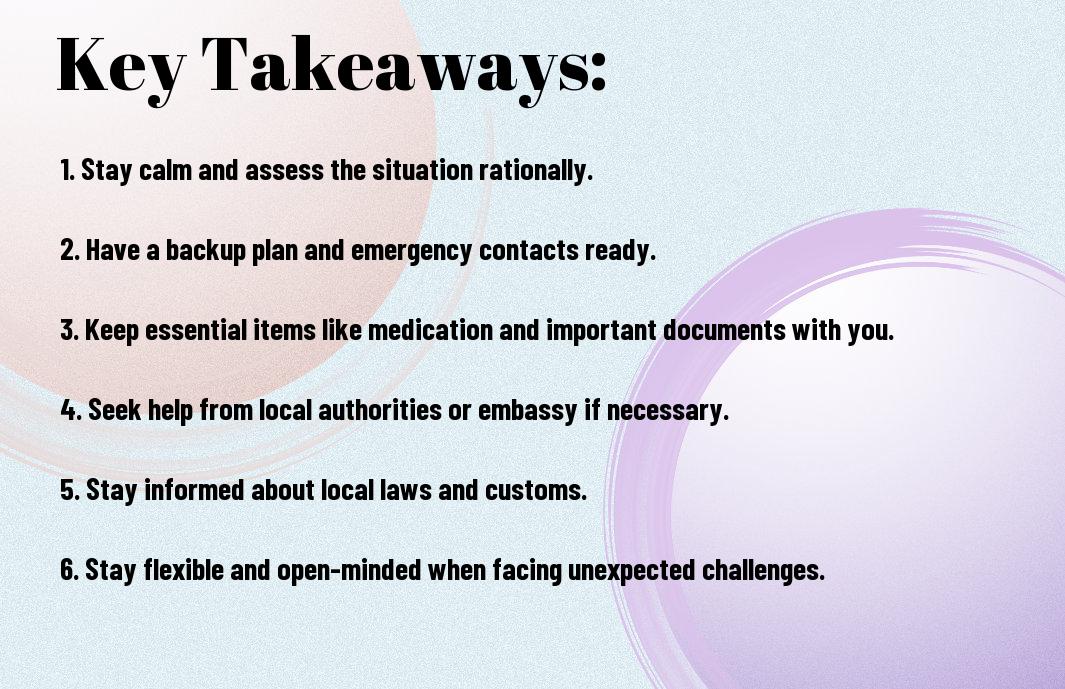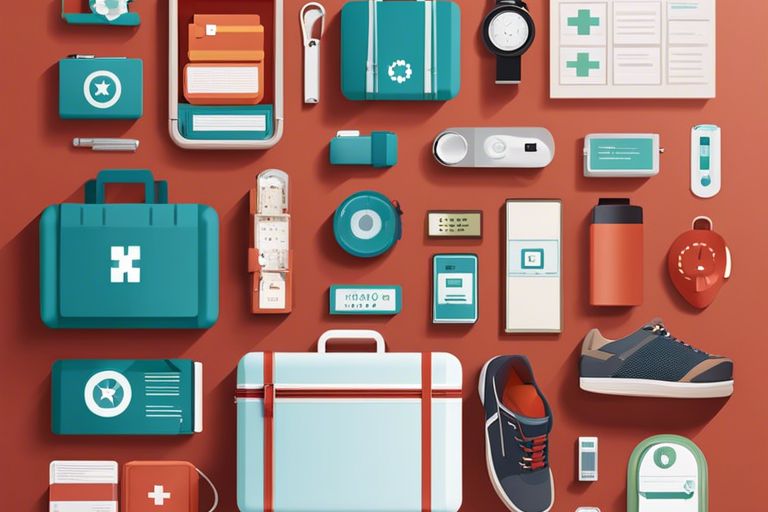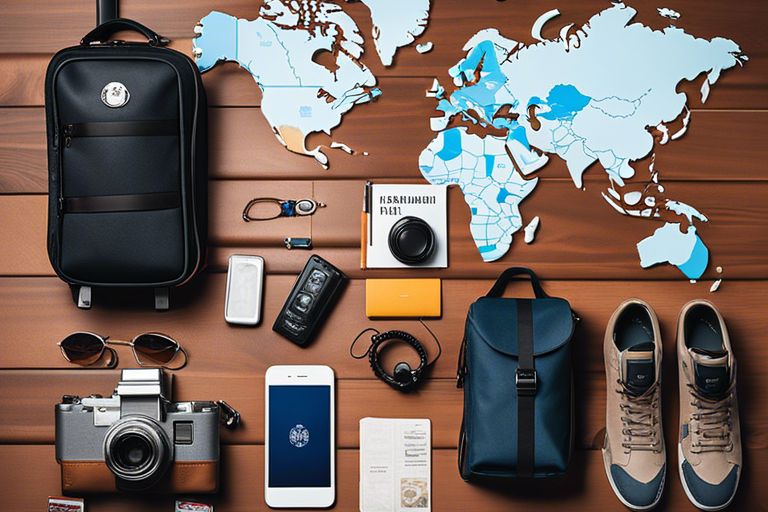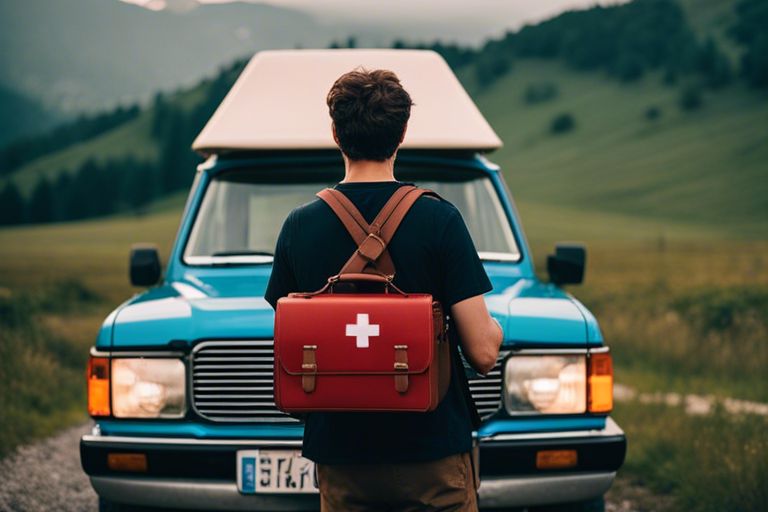Table of Contents
Encountering travel emergencies and unexpected situations can be daunting, but with the right preparation and knowledge, you can effectively navigate through these challenges. Whether it’s a lost passport, a medical emergency, or a natural disaster, having a plan in place can make all the difference. In this blog post, we’ll cover essential tips and strategies for handling a wide range of travel emergencies and unexpected situations, empowering you to stay safe and well-prepared on your journeys.
Key Takeaways:
- Stay calm: In any travel emergency, it is important to stay calm and assess the situation before taking action.
- Be prepared: Always have a backup plan, such as copies of important documents and emergency contacts, in case of unexpected situations.
- Seek help: Don’t be afraid to reach out for assistance from local authorities, your travel insurance provider, or other trusted sources when facing a travel emergency.
- Adapt and improvise: Sometimes unexpected situations call for creative solutions, so be ready to adapt and improvise to handle the emergency effectively.
- Learn from the experience: After the emergency has been resolved, take the time to reflect on the situation and learn from it to better prepare for future travel emergencies.

Health and Medical Emergencies
Any time you travel, it’s important to be prepared for health and medical emergencies. Whether it’s a minor injury or a serious illness, knowing how to handle these situations can make a big difference in the outcome.
Dealing with Accidents and Injuries
When you are faced with an accident or injury while traveling, the most important thing to do is to stay calm and assess the situation. If it’s a minor injury, you can use a first aid kit to provide immediate care. For more serious injuries, it’s crucial to seek medical help immediately. If the injury is severe, don’t hesitate to call for emergency assistance. Remember to keep your emergency contact information and insurance details easily accessible at all times.
Managing Illnesses and Accessing Medical Care
While traveling, it’s possible to fall ill due to various reasons such as change in climate, food, or water. If you start feeling unwell, don’t ignore the symptoms. It’s important to seek medical care at the earliest convenience. Research in advance about local healthcare facilities and pharmacies in the area you are traveling to. If possible, consider purchasing travel health insurance to ensure you have coverage for medical expenses. Remember to take necessary precautions such as staying hydrated and avoiding consuming food or drinks of questionable quality.
Travel Documentation Issues
Now, let’s talk about one of the most common and potentially stressful travel emergencies – documentation issues. No matter how carefully you plan, there is always a chance that something could go wrong with your travel documents, and it’s crucial to know how to handle these unexpected situations.
Handling Lost or Stolen Passports
If you find yourself in the unfortunate situation of having your passport lost or stolen while traveling, it is essential to act quickly. First and foremost, report the loss or theft to the local authorities and obtain a police report. This document will be necessary when applying for a new passport. Additionally, contact the nearest embassy or consulate of your country to apply for a new passport. Make sure to keep copies of your passport and other important documents, both physically and digitally, to facilitate the replacement process. If you need to travel urgently, the embassy or consulate may also issue an emergency travel document to get you back home.
Responding to Visa Complications
Visa complications can quickly become a significant travel emergency, and you must address them promptly. If you encounter issues with your visa, such as expiration or denial, contact the local immigration authorities or the nearest embassy or consulate of your country. They can provide you with information on how to extend your visa, apply for a new one, or resolve any other issues related to your immigration status. Ignoring visa problems can result in deportation, fines, or being barred from entering the country again, so it’s crucial to address them immediately.

Safety and Security Concerns
Despite your best efforts to plan and prepare for your trip, unexpected safety and security concerns can arise while traveling. It’s important to be aware of potential risks and have a plan in place to handle emergencies.
Navigating Natural Disasters While Traveling
When traveling to a new destination, you may encounter natural disasters such as hurricanes, earthquakes, or wildfires. It’s essential to stay informed about potential risks before and during your trip. Research the area’s history of natural disasters and familiarize yourself with emergency procedures. Always keep emergency supplies such as food, water, and a first aid kit on hand. If a natural disaster does occur, follow the guidance of local authorities and seek shelter in a secure location.
Addressing Theft and Personal Safety
Unfortunately, theft and personal safety concerns can affect travelers in any destination. To protect yourself and your belongings, be cautious in crowded areas and be mindful of your surroundings. Keep your belongings secure and avoid displaying valuable items in public. When exploring a new city, research safe areas and avoid walking alone at night. In the event of theft or a personal safety threat, contact local authorities immediately and seek assistance from embassy or consulate if necessary.

Logistic Challenges
Lastly, dealing with unexpected travel situations often involves overcoming logistical challenges that can disrupt your plans and cause stress. From transportation mishaps to lost or delayed luggage, being prepared to handle these issues can help mitigate the impact they have on your trip.
Overcoming Transportation Disruptions
One of the most common logistical challenges you may encounter while traveling is transportation disruptions. Whether it’s a flight delay, a missed connection, or a last-minute change in your itinerary, these situations can be frustrating and stressful. To overcome transportation disruptions, it’s important to stay informed and proactive. Keep your airline or travel agent’s contact information easily accessible, and be prepared to quickly rebook or make alternate arrangements if necessary. Additionally, consider purchasing travel insurance that includes coverage for transportation disruptions to minimize the financial impact of unexpected changes to your travel plans.
Coping with Lost or Delayed Luggage
Another potential logistical challenge you may face is dealing with lost or delayed luggage. Arriving at your destination only to discover that your luggage has been lost or is delayed can be a major inconvenience. To cope with this situation, it’s important to remain calm and immediately report the issue to the airline or transportation provider. Make sure to keep all your important documents and valuables with you in your carry-on luggage, and consider packing a change of clothes and essential toiletries in your carry-on as well. Strongly emphasize the importance of having a detailed inventory of the contents of your checked luggage and consider purchasing travel insurance that covers lost or delayed baggage to help alleviate the impact of this inconvenience.
Cultural and Communication Obstacles
Your travel experience can be greatly affected by cultural and communication obstacles that you may encounter in a foreign country.
Bridging Language Barriers
One of the most significant challenges in a foreign country is the language barrier. Not being able to communicate effectively can lead to misunderstandings and frustration. It is important to make an effort to learn some basic phrases in the local language or carry a translation app to help you bridge this gap. Additionally, non-verbal communication, such as hand gestures and body language, can also be helpful in getting your message across.
Respecting Local Customs and Laws
When traveling to a different country, it is crucial to familiarize yourself with the local customs and laws. What may be acceptable in your home country could be offensive or even illegal in another. It’s important to educate yourself on cultural practices, such as dress codes, greetings, and dining etiquette, to show respect for the local traditions and avoid unintentional actions that could cause offense. Likewise, being aware of the local laws can help you avoid getting into legal trouble and ensure a smooth travel experience.
Financial Emergencies
After an unexpected financial emergency while traveling, it can be challenging to figure out the best course of action. However, staying calm and acting quickly is essential in such situations. Here are some tips on how to handle financial emergencies during your travels.
Dealing with Lost or Stolen Credit Cards
If you find yourself without your credit cards while traveling, it’s important to act fast. First, report the loss or theft to your credit card company. This will prevent any unauthorized transactions from occurring. Keep a record of the date and time you reported the loss, as well as the name of the representative you spoke with. If you have travel insurance, be sure to check whether it covers lost or stolen credit cards and if there is a reimbursement process in place.
Accessing Funds in Emergency Situations
In an emergency when you find yourself without access to your credit cards or cash, it’s important to have a backup plan. Consider carrying a prepaid travel card or having a trusted friend or family member who can transfer funds to you in an emergency. Contact your bank to see if they have any partnerships with banks in the area where you are traveling, which can make it easier to access emergency funds. Remember, withdrawing cash from ATMs may incur additional fees, so it’s important to understand your bank’s policies and any associated charges.
Conclusion
Following this guide on how to handle travel emergencies and unexpected situations will ensure that you are well-prepared for any unforeseen events that may occur during your travels. By staying calm, being proactive, and having a plan in place, you can effectively handle any challenges that come your way, ensuring that your trip remains as smooth and enjoyable as possible. Remember to always prioritize your safety and well-being, and seek help from local authorities or professionals when needed. With these tips in mind, you can confidently navigate through any travel emergency or unexpected situation that may arise.
FAQ: How to Handle Travel Emergencies and Unexpected Situations
Q: What should I do if I lose my passport while traveling?
A: If you lose your passport while traveling, immediately contact the nearest embassy or consulate of your home country. They will assist you in obtaining a replacement or temporary travel documents. It’s also important to file a police report and keep a copy of it for your records. Additionally, contact your airline and accommodations to inform them of the situation and seek their support.
Q: What actions should I take if I encounter a medical emergency abroad?
A: In the event of a medical emergency during your travels, seek immediate medical attention. If you have travel insurance, notify your provider so they can assist with medical expenses and provide guidance. Be sure to keep copies of any medical records and receipts for reimbursement purposes. It’s also recommended to contact your embassy or consulate for additional support and to inform loved ones back home about the situation.
Q: How can I protect myself and my belongings from theft or scams while traveling?
A: To avoid theft or scams, be vigilant and aware of your surroundings at all times. Keep your valuables secure and never leave them unattended. Use hotel safes for passports, extra cash, and other important documents. Avoid displaying large amounts of cash and consider using a money belt or hidden pouch. Be cautious of unsolicited offers and only use reputable transportation services. Research common scams in your destination and be mindful of any suspicious behavior. It’s also advisable to have emergency contact information readily available, such as the local police and your embassy or consulate.

